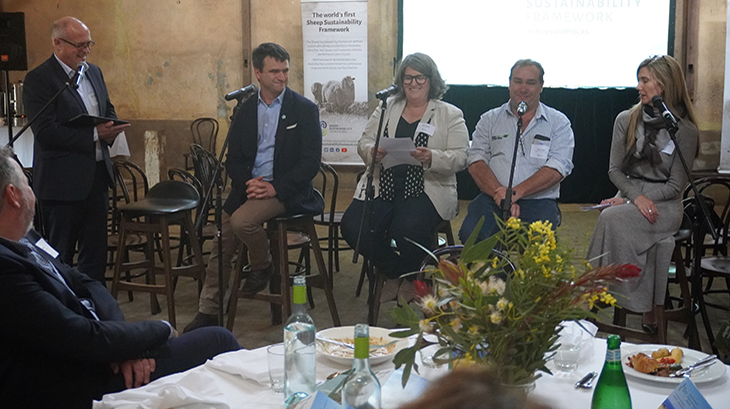Bleat Box: Meet Lachlan Monsbourgh

Lachlan Monsbourgh (second from left) in discussion at the launch of the 2023 SSF Annual Report with SSF Chair Dr Scott Williams (left), SA sheepmeat and wool producer Jane Kellock of Kellock Farming (centre), Mark Inglis, Farm Assurance and Supply Chain Manager, Thomas Foods International, and Michelle Dalzell, Michell Direct Sourcing Manager, Michell Wool. Image: Edwina Clowes.
Lachlan Monsbourgh is Rabobank’s Global Rural Agricultural and Environmental Lead and joined the SSF Sustainability Steering Group (SSG) in March 2022. He brings to the role a decade of experience in sustainability and commodity trading in countries as diverse as Papua New Guinea, Mexico and Switzerland. Lachlan is a subject matter expert in agriculture and sustainability for Rabobank’s rural portfolio, rolling out carbon calculators to rural clients in the Americas, Australia and New Zealand and developing training programs for leadership. He sits on the Global Sustainability Finance Panel and contributes to policy direction.
Sustainability Steering Group (SSG) member Lachlan Monsbourgh says he’s surprised agricultural producers are still ‘going over the basics’ in terms of sustainability, but stresses the importance of staying on message.
“Food and agriculture issues are pre-farm gate and the understanding of the industry by consumer goods companies and consumers is not always as granular as it needs to be, so there can be a lack of awareness in terms of farm-related sustainability,” Lachlan said.
“The real impact of the Sheep Sustainability Framework will be felt over five to 10 years so rather than following shifts, we need to be steadfast in working on the material themes we’ve identified.
“Change on farm is measured and prudent. Farmers aren’t slow, but the risks that they have to manage mean any abrupt change in their systems without proper due diligence could result in their businesses becoming unviable very quickly – the Australian agricultural landscape is littered with examples.
“We need to have a firm understanding of what’s integral to the sheep and wool industry, back it up with data and show improvement over the medium term, which is why SSF’s role is so important.”
Working for Rabobank from his farm in western Victoria, Lachlan brings a decade of global experience in agricultural sustainability and commodity trading to the SSG.
Equipped with a degree in agricultural commerce from the University of Sydney, he spent the first decade of his career developing and commercialising systems for emerging industries like cocoa across Asia, Latin America, Europe and the Pacific, progressing to head of Global Cocoa Sustainability R&D with Barry Callebaut in Zurich.
“The difference between my early experiences and my current SSG role is that they were in emerging markets, but probably the biggest thing that’s translatable is how certification schemes operate and the impact of them,” he said.
Lachlan believes that biodiversity will follow climate and carbon as the next ‘hot topic’ in the sustainability movement.
“The SSF will define material topics within biodiversity in the next 12 to 18 months so we can tell that medium-term narrative of how we’ve defined it and bring people on board,” he said.
“In short, it’s likely to be trees on farm and management of ground cover, so we’re not impacting soil health and understanding the impact of farming practices on indigenous flora and fauna.
“There is a vast gap between consumers’ understanding of biodiversity and how you manage it on a sheep farm, and the SSF is there to help brands translate this to consumer goods.”
Lachlan identifies another material issue that he sees as a priority for sheep producers – access to labour.
“Labour is a fundamental issue and when we’re in a situation of full employment and high costs, substitute industries for labour are becoming more and more attractive.
“If we’re not actually resourcing R&D into reducing labour units per sheep or flock, it’s going to be very difficult to retain a mobile and flexible workforce as we have known it for the last 150 years.”